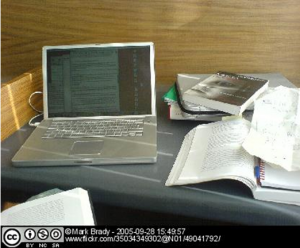I’m not sure about the detail of this one, but as a physicist I couldn’t resist the analogy between quantum mechanics and the testing effect!
‘The testing effect represents a conundrum, a small version of the Heisenberg uncertainty principle in psychology: Just as measuring the position of an electron changes that position, so the act of retrieving information from memory changes the mnemonic represention underlying retrieval – and enhances later retention of the tested information.’
Roediger, H. L., III, & Karpicke, J. D. (2006). The power of testing memory: Basic research and implications for educational practice. Perspectives on Psychological Science, 1, 181-210. pg 182.

